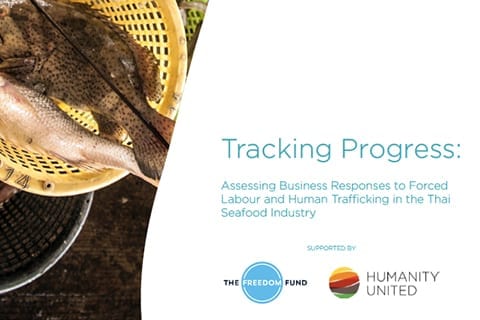
Tracking Progress: Forced Labor in the Thai Seafood Industry
It’s no secret that many of the products that we buy and use every day are made by workers suffering from severe exploitation. There is evidence of forced labor in every tier of corporate supply chains, including seafood. These problems persist, despite years of corporate attention.
Today, Humanity United and The Freedom Fund released Tracking Progress: Assessing Business Responses to Forced Labour and Human Trafficking in the Thai Seafood Industry. The research, conducted by Praxis Labs, finds that the seafood industry has indeed made some progress. True industry transformation, however, is being undermined by a failure to fundamentally change the business model. In short, decisions are still driven primarily by price, and do not include realistic considerations relating to human rights and environmental sustainability.
This report is a follow-up to a 2016 report that found that the private sector, operating under lax government oversight, had largely absolved itself of all responsibility for practices across their supply chains.
Encouragingly, this new report highlights a number of areas of emerging good practice and progress.
In 2014, for example, only 11% of companies had some degree of traceability in their supply chains; today, 82% of companies can claim to know where some portion of its products are sourced. Recruitment practices are improving, including direct hiring that includes external oversight by NGOs. Some businesses have introduced human rights due diligence that is triangulated with external validation.
Additionally, the Seafood Task Force, an industry-led multi-stakeholder initiative, has also made some progress. Alignment around a single code of conduct should make it easier for suppliers to focus on compliance. Supplier education, farm to plant traceability, and supply chain mapping are also positive trends. The Task Force’s auditable standard for vessels also has the potential to reduce audit fatigue. Businesses across the spectrum are making efforts to work with their suppliers, including providing tools and support with implementation.
These practices, and the progress that they represent, are a good start. But if we scratch the surface, there are large gaps still remaining.
While there are some leading practices emerging, many businesses are often focusing more on “check the box” exercises, rather than prioritizing meaningfully improving conditions for workers.
